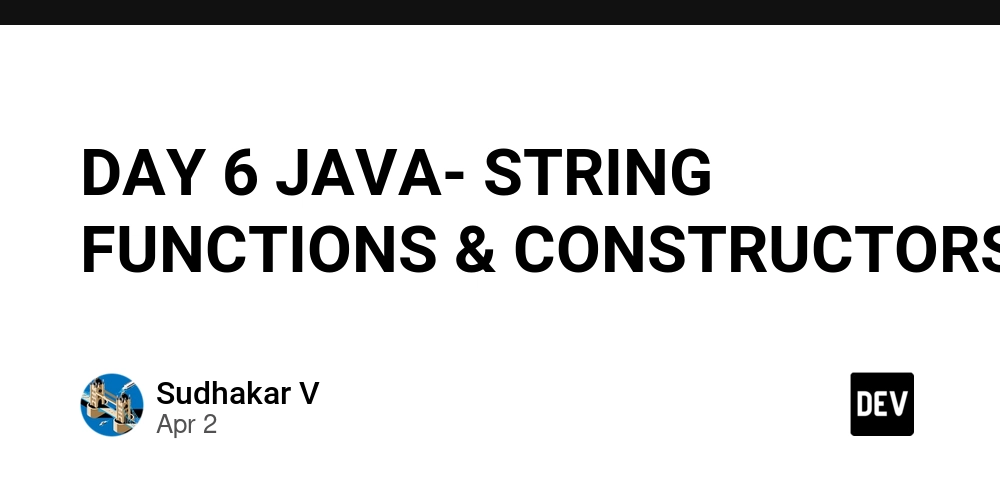DAY 6 JAVA- STRING FUNCTIONS & CONSTRUCTORS
Java Functions and String Class Functions in Java 1. Method Basics Definition: A block of code that performs a specific task Syntax: modifier returnType methodName(parameters) { // method body return value; // if returnType is not void } Example: public int addNumbers(int a, int b) { return a + b; } 2. Method Types Static methods: Belong to the class (ClassName.methodName()) Instance methods: Belong to objects (object.methodName()) Built-in methods: Predefined in Java libraries (e.g., Math.sqrt()) 3. Method Overloading Multiple methods with same name but different parameters: void print(int i) { System.out.println(i); } void print(String s) { System.out.println(s); } String Class in Java 1. String Creation String s1 = "Hello"; // String literal (stored in string pool) String s2 = new String("Hello"); // String object (heap memory) 2. Important String Methods Comparison Methods boolean equals(String str) // Case-sensitive comparison boolean equalsIgnoreCase(String) // Case-insensitive int compareTo(String) // Lexicographical comparison (returns 0 if equal) Search Methods int length() // Returns string length char charAt(int index) // Character at specific position int indexOf(String str) // First occurrence of substring int lastIndexOf(String str) // Last occurrence of substring boolean contains(CharSequence) // Checks if string contains substring Modification Methods String concat(String str) // Concatenation (same as + operator) String substring(int begin) // Extracts substring String substring(int b, int e) // Extracts substring from b to e-1 String replace(char old, char new) // Replaces characters String toLowerCase() // Converts to lowercase String toUpperCase() // Converts to uppercase String trim() // Removes leading/trailing whitespace Conversion Methods static String valueOf(primitive) // Converts primitive to String char[] toCharArray() // Converts to character array String[] split(String regex) // Splits string using regex 3. String Immutability Strings are immutable (cannot be changed after creation) Operations like concat(), substring() return new String objects Example: String s = "Hello"; s.concat(" World"); // Returns new String, original unchanged System.out.println(s); // Still prints "Hello" 4. StringBuilder (Mutable Alternative) StringBuilder sb = new StringBuilder("Hello"); sb.append(" World"); // Modifies existing object System.out.println(sb); // Prints "Hello World" 5. Important Notes Always use equals() for string comparison, not == For heavy string manipulation, use StringBuilder for better performance String literals are stored in string pool for memory efficiency Example Combining Functions and Strings public class StringOperations { // Function to reverse a string public static String reverseString(String input) { return new StringBuilder(input).reverse().toString(); } // Function to count vowels public static int countVowels(String str) { int count = 0; String lowerStr = str.toLowerCase(); for (int i = 0; i

Java Functions and String Class
Functions in Java
1. Method Basics
- Definition: A block of code that performs a specific task
- Syntax:
modifier returnType methodName(parameters) {
// method body
return value; // if returnType is not void
}
- Example:
public int addNumbers(int a, int b) {
return a + b;
}
2. Method Types
-
Static methods: Belong to the class (
ClassName.methodName()) -
Instance methods: Belong to objects (
object.methodName()) -
Built-in methods: Predefined in Java libraries (e.g.,
Math.sqrt())
3. Method Overloading
Multiple methods with same name but different parameters:
void print(int i) { System.out.println(i); }
void print(String s) { System.out.println(s); }
String Class in Java
1. String Creation
String s1 = "Hello"; // String literal (stored in string pool)
String s2 = new String("Hello"); // String object (heap memory)
2. Important String Methods
Comparison Methods
boolean equals(String str) // Case-sensitive comparison
boolean equalsIgnoreCase(String) // Case-insensitive
int compareTo(String) // Lexicographical comparison (returns 0 if equal)
Search Methods
int length() // Returns string length
char charAt(int index) // Character at specific position
int indexOf(String str) // First occurrence of substring
int lastIndexOf(String str) // Last occurrence of substring
boolean contains(CharSequence) // Checks if string contains substring
Modification Methods
String concat(String str) // Concatenation (same as + operator)
String substring(int begin) // Extracts substring
String substring(int b, int e) // Extracts substring from b to e-1
String replace(char old, char new) // Replaces characters
String toLowerCase() // Converts to lowercase
String toUpperCase() // Converts to uppercase
String trim() // Removes leading/trailing whitespace
Conversion Methods
static String valueOf(primitive) // Converts primitive to String
char[] toCharArray() // Converts to character array
String[] split(String regex) // Splits string using regex
3. String Immutability
- Strings are immutable (cannot be changed after creation)
- Operations like
concat(),substring()return new String objects - Example:
String s = "Hello";
s.concat(" World"); // Returns new String, original unchanged
System.out.println(s); // Still prints "Hello"
4. StringBuilder (Mutable Alternative)
StringBuilder sb = new StringBuilder("Hello");
sb.append(" World"); // Modifies existing object
System.out.println(sb); // Prints "Hello World"
5. Important Notes
- Always use
equals()for string comparison, not== - For heavy string manipulation, use
StringBuilderfor better performance - String literals are stored in string pool for memory efficiency
Example Combining Functions and Strings
public class StringOperations {
// Function to reverse a string
public static String reverseString(String input) {
return new StringBuilder(input).reverse().toString();
}
// Function to count vowels
public static int countVowels(String str) {
int count = 0;
String lowerStr = str.toLowerCase();
for (int i = 0; i < lowerStr.length(); i++) {
char ch = lowerStr.charAt(i);
if (ch == 'a' || ch == 'e' || ch == 'i' || ch == 'o' || ch == 'u') {
count++;
}
}
return count;
}
public static void main(String[] args) {
String text = "Hello World";
System.out.println("Original: " + text);
System.out.println("Reversed: " + reverseString(text));
System.out.println("Vowel count: " + countVowels(text));
System.out.println("Uppercase: " + text.toUpperCase());
System.out.println("Contains 'World'? " + text.contains("World"));
}
}
Common Errors in Java Constructors and How to Overcome Them
Constructors in Java are special methods used to initialize objects, but they can lead to several common errors. Here's how to identify and fix them:
1. Default Constructor Not Available When Needed
Error:
public class Person {
private String name;
public Person(String name) {
this.name = name;
}
}
// Later...
Person p = new Person(); // Compile error - no default constructor
Solution:
- Either provide a default constructor:
public Person() {
this.name = "Unknown";
}
- Or always use the parameterized constructor
2. Constructor Recursion (StackOverflowError)
Error:
public class Infinite {
public Infinite() {
new Infinite(); // Recursive call
}
}
Solution:
- Avoid calling the same constructor within itself
- Use factory methods if complex initialization is needed
3. Field Shadowing
Error:
public class Rectangle {
private int width;
public Rectangle(int width) {
width = width; // Assignment to parameter, not field
}
}
Solution:
- Use
thiskeyword:
public Rectangle(int width) {
this.width = width;
}
4. Calling Overridable Methods in Constructor
Error:
public class Parent {
public Parent() {
init(); // Dangerous if init() is overridden
}
public void init() {
System.out.println("Parent init");
}
}
public class Child extends Parent {
private String value;
@Override
public void init() {
System.out.println(value.length()); // NullPointerException
}
}
Solution:
- Avoid calling overridable methods in constructors
- Make methods final if they must be called:
public final void init() { ... }
5. Constructor Leaking 'this' Reference
Error:
public class Leaker {
public static Leaker instance;
public Leaker() {
instance = this; // 'this' escapes before full construction
}
}
Solution:
- Avoid publishing
thisreference in constructor - Use factory pattern instead
6. Missing Super Constructor Call
Error:
public class Child extends Parent {
public Child() {
// Implicit super() called, but Parent has no default constructor
}
}
public class Parent {
public Parent(int x) { ... }
}
Solution:
- Explicitly call parent constructor:
public Child() {
super(0); // Provide required parameter
}
7. Exception in Constructor
Error:
public class Resource {
public Resource() throws IOException {
// Might throw exception
}
}
// Then creation fails:
Resource r = new Resource(); // Unhandled exception
Solution:
- Handle exception at creation point:
try {
Resource r = new Resource();
} catch (IOException e) {
// Handle error
}
- Or use static factory method:
public static Resource create() {
try {
return new Resource();
} catch (IOException e) {
return null; // or throw unchecked exception
}
}
Best Practices for Constructors
- Keep constructors simple - delegate complex initialization to methods
- Use constructor chaining - one primary constructor with others calling it
- Consider static factory methods as alternative to complex constructors
- Make defensive copies when storing mutable parameters
- Document thread-safety if class is meant for multithreaded use
Example of Well-Designed Constructor
public class Employee {
private final String name;
private final int id;
private final Date hireDate;
// Primary constructor
public Employee(String name, int id, Date hireDate) {
this.name = Objects.requireNonNull(name, "Name cannot be null");
this.id = id;
this.hireDate = new Date(hireDate.getTime()); // Defensive copy
}
// Secondary constructor
public Employee(String name, int id) {
this(name, id, new Date()); // Default to current date
}
// Static factory method
public static Employee createWithValidation(String name, int id) {
if (id <= 0) throw new IllegalArgumentException("Invalid ID");
return new Employee(name, id);
}
}
By following these guidelines, you can avoid most common constructor-related issues in Java. TBD









![[DEALS] Microsoft Office Professional 2021 for Windows: Lifetime License (75% off) & Other Deals Up To 98% Off – Offers End Soon!](https://www.javacodegeeks.com/wp-content/uploads/2012/12/jcg-logo.jpg)



































































